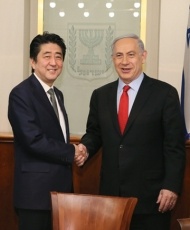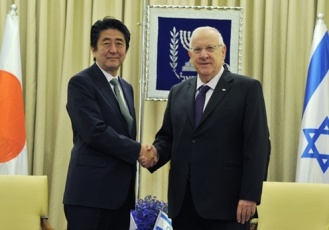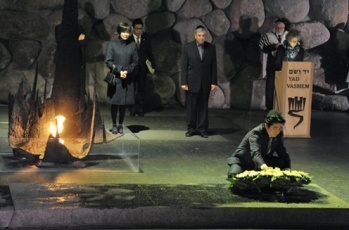Japan-Israel Relations
Prime Minister Shinzo Abe Visits Israel
January 21, 2015
 Photo: Cabinet Public Relations Office
Photo: Cabinet Public Relations Office
 Photo: Cabinet Public Relations Office
Photo: Cabinet Public Relations Office
 Photo: Cabinet Public Relations Office
Photo: Cabinet Public Relations Office
Prime Minister Shinzo Abe visited the State of Israel from Sunday, January 18 to Tuesday, January 20. The overview is as follows.
1. Major events
January 18 (Sunday)
- Summit meeting with Prime Minister Mr. Benjamin Netanyahu
- Attendance at a meeting between the economic mission accompanying Prime Minister Abe, and Prime Minister Netanyahu
- Attendance at the Japan-Israel Business Forum
January 19 (Monday)
- Visit to Yad Vashem (the Holocaust Memorial Museum)
- Summit meeting with Prime Minister Netanyahu
- Courtesy call on President Reuven Rivlin
- Visit to the Old City of Jerusalem
- Courtesy call from leader of Labor Party Mr. Isaac Herzog
- Attendance at an alumni meeting of participants in the "Invitation Program for Israeli and Palestinian Youth" and the "Middle East Peace Project"
- Courtesy call from U.S. Senator John McCain and others
- Attendance at a dinner hosted by Prime Minister Netanyahu and his wife
January 20 (Tuesday)
- Press conference
2. Overview of major events
(1) Summit meetings with Prime Minister Netanyahu
On the afternoon of January 18 and the morning of January 19, Prime Minister Abe held meetings with Prime Minister Netanyahu. Japan-Israel Joint Press Release (PDF)  was issued following the meetings.
was issued following the meetings.
At the beginning, Prime Minister Abe conveyed his condolences over the Jewish casualties that resulted from a terrorist attack in Paris, and affirmed the need for ongoing efforts by the international community to contend with terrorism.
Bilateral relations
- Politics and security
- The two leaders welcomed the active exchanges taking place between their national security authorities and defense authorities, and expressed expectation over cooperation in the cyber field on which a bilateral dialogue was held in November last year.
- Economic field
- The two leaders expressed their appreciation for a shared view on cooperation on industrial R&D that was reached with the Israeli side when Japan's Minister of Economy, Trade and Industry visited Israel in July last year. The two leaders noted that progress is also being seen in cooperation and collaborations between individual companies, and shared the view that they will work to maintain this momentum. Prime Minister Abe welcomed the Plan to Strengthen Economic Ties and Cooperation with Japan that was decided on by the Government of Israel. Both sides shared the view that they will instruct working-level officials to aim to finalize investment agreement negotiations by the end of the year.
- Strengthening science and technology cooperation
- Both leaders welcomed that Japan Science and Technology Agency and Israeli Ministry of Science, Technology and Space have signed a Memorandum of Cooperation (MOC) and have agreed to implement a corroborative research program in the field of Information and Communication Technology.
- People-to-people exchanges
- The two leaders confirmed the importance of vitalizing people-to-people exchanges, including tourism, and expressed expectation that negotiations on introducing a Working Holiday Visa Program will be concluded promptly.
International arena
- UN Security Council reform, Election of the non-permanent members of the Security Council
- Prime Minister Abe pointed to the need for concrete action to reform the UN Security Council this year, which is the 70th anniversary of the establishment of the UN, and requested cooperation for achieving reform.
- Nuclear disarmament and non-proliferation
- Prime Minister Abe said that as the only country which has ever suffered from atomic bombings, Japan is placing importance on nuclear disarmament and non-proliferation this year, which is the 70th anniversary of the bombings. He expressed expectation that as a non-nuclear nation Israel will join the Non-Proliferation Treaty (NPT), promptly ratify the CTBT, and make further efforts to promptly hold an International Conference on Zone Free of weapons of mass destruction in the Middle East.
Regional affairs
- Middle East peace
- Prime Minister Abe voiced concern about the chain of violence and mistrust since last summer, and requested that behavior that is likely to escalate the conflict be avoided. He strongly requested a review of the suspension of the return of tax revenues to the Palestinian Authority that is being implemented by Israel. Prime Minister Abe also requested a halt to settlement activities, which violate international law. Following on from a Summit Meeting in May last year, he expressed hope for greater cooperation by Israel on the "Corridor for Peace and Prosperity" initiative.
- Middle East situation
- Prime Minister Abe explained that Japan will implement new assistance totaling 200 million U.S. dollars as a measure for contending with ISIL. Additionally, in regard to the Iranian nuclear issue, Prime Minister Abe said Japan continues to seek a diplomatic solution, and emphasized that it will be important for the international community, including Israel, to support the EU3+3 framework and perform constructive roles in order to reach a final agreement during the negotiating period, which has been extended.
(2) Attendance at a meeting between the economic mission accompanying Prime Minister Abe, and Prime Minister Netanyahu; Attendance at Japan-Israel business Forum
- i) On the afternoon of January 18, Prime Minister Abe attended a meeting between the economic mission accompanying him, and Prime Minister Netanyahu. At the beginning of the meeting Prime Minister Abe pointed out that Prime Minister Netanyahu's visit to Japan in May last year comprehensively elevated the status of the relationship between the two countries, and in particular, economic relations between the two countries harbor significant potential.
- ii) Following the above-mentioned meeting, Prime Minister Netanyahu showed Prime Minister Abe around the booths of five Israeli companies set up at the Business Forum venue, and Prime Minister Abe looked around the companies' displays.
- iii) In an opening address at the economic seminar, Prime Minister Abe said that bilateral relations are deepening in all fields, but within that the progress on the economic front is particularly striking, and there is no reason for Japan, which positions "innovation" as the engine of economic growth, not to cooperate with Israel, which produces innovative technologies. Additionally, he said the Government of Japan dispatched the Minister of Economy, Trade and Industry to Israel in summer last year, and as a result of exchanging an MOC in the fields of industrial research and development, it has become possible for companies of both countries to receive government support when undertaking research and development cooperation, and explained that Japan Science and Technology Agency and Israeli Ministry of Science, Technology and Space exchanged an MOC on the same day with a view to cooperating in the ICT field.
- iv) Following Prime Minister Abe's opening address, he showed Prime Minister Netanyahu a booth promoting the sale of Japanese sake and plum wine that was set up within the Business Forum venue, and a tasting took place.
(3) Courtesy call on President Rivlin
- i) On the afternoon of January 19, Prime Minister Abe made a courtesy call on President Rivlin.
- ii) Prime Minister Abe said visiting Yad Vashem had renewed his determination to shoulder a responsibility for creating a world free of discrimination and war, along with stating that he wants to further advance relations between the two countries based on their bilateral bond and friendly relationship.
- iii) The two leaders exchanged views on the current state of Middle East peace and challenges, and Prime Minister Abe expressed expectation over President Rivlin's leadership in achieving peace.
(4) Courtesy call from Labor Party leader Mr. Herzog
- i) On the afternoon of January 19, Prime Minister Abe received a courtesy call from Labor Party leader Herzog.
- ii) Prime Minister Abe noted that there is a connection between the Herzog family and Japan, including the attendance by Mr. Herzog's late father, H.E. Mr. Chaim Herzog, President of Israel, at the funeral ceremony of Emperor Showa and the ceremony for the accession to the throne of the present Emperor. In addition, Prime Minister Abe said that Japan's hope is coexistence and prosperity between Israel and Palestine, and Japan is determined to continue to strive for regional stability and prosperity.
- iii) The two sides exchanged views on the situation surrounding Middle East peace and regional affairs.
(5) Visit to Yad Vashem (the Holocaust Memorial Museum)
- i) On the morning of January 19, Prime Minister Abe visited Yad Vashem and inspected the history museum where photographs, personal mementoes, public documents and other items related to the Holocaust are displayed, along with offering flowers at the Hall of Remembrance.
- ii) After offering the flowers, Prime Minister Abe visited a memorial tree on the Yad Vashem grounds for former Vice-Consul Chiune Sugihara, which was planted in recognition of Sugihara as one of the "Righteous Among the Nations." Prime Minister Abe then made the following entry in the register at the exit of the "Children's Memorial":
"I wish to express my deepest condolences to the victims and express my determination to prevent the recurrence of such tragedy on the occasion of the 70th anniversary of the liberation of Auschwitz.
Shinzo Abe, Prime Minister of Japan." - iii) Lastly, Prime Minister Abe addressed journalists, and said the following:
- (i) Allow me to convey the great respect I feel from the bottom of my heart for the efforts you have made in working to pass on to future generations the hardships the Jewish people endured, as a legacy of all humankind. I felt great solemnity in the face of your forefathers, who overcame profound grief to found the nation of Israel.
- (ii) Today, I have learned how much merciless humans can be by singling out a group of people and making that group the object of discrimination and hatred. In March, last year, I visited the Anne Frank House in Amsterdam. Today I find myself full determined.
- (iii) Ha-sho'a le'olam lo od. The Holocaust, never again.
- (iv) Among our forefathers was a Chiune Sugihara. A good number of Japanese citizens also extended help to the Jewish refugees, as they headed toward Japan with Sugihara's visas. There is the courage we would like to follow.
- (v) With the Eternal Flame burning here at Yad Vashem serving as abeacon, we must continue to work towards the realization of a world free of discrimination and war, where human rights are protected. Japan is determined to contribute even more actively to world peace and stability.
- (vi) This year as we mark the 70th anniversary of the end of World War II and the liberation of Auschwitz, I make a pledge that we should never ever let such tragedies be repeated again.
(6) Attendance at an alumni meeting of participants in the "Invitation Program for Israeli and Palestinian Youth" and the "Middle East Peace Project"
- i) On the afternoon of January 19, Prime Minister Abe and Mr. Yasuhide Nakayama, State Minister for Foreign Affairs, attended the alumni meeting of past participants in projects to invite young people from both Israel and Palestine that are held every year by the Government of Japan and regional governments.
- ii) In an opening address at the alumni meeting, Prime Minister Abe cited the term "Wa wo motte tattoshi to nasu (Harmony is to be valued)" and once again conveyed to participants his wish that the spirit of harmony that they learned through staying in Japan will help them to overcome distances with their neighbors. Furthermore, he stated that Japan is determined to continue to sow seeds to building confidence, and expressed expectation that all the participants would bear the fruits of peace.
- iii) Following that, State Minister Nakayama mentioned the experiences of Japan, which overcame "conflicts" to build friendships, and said the conflict between Israel and Palestine will inevitably come to an end, and he hopes that the alumni meeting represents a new start among the participants.
(7) Courtesy call from U.S. Senator John McCain and other Senetors
- i) On the afternoon of January 19, Prime Minister Abe received a courtesy call from Senator John McCain (Senate Armed Services Committee Chairman)and six U.S. Senators (Senator Bob Corker (Senate Foreign Relations Committee Chairman), Senator Lindsey Graham, Senator John Barrasso, Senator Joseph Donnelly, Senator Timothy Kaine andSenator Angus King ) who were visiting the region.
- ii) Prime Minister Abe expressed appreciation for the Senators' contributions to the Japan-U.S. relations, and said that after fighting each other during the War, Japan and the United States have formed a robust alliance through post-war reconciliation, and have worked together to contribute to regional and global peace and prosperity. He also said that he hoped both countries would continue to work together to contribute in the future. Both sides shared the recognition on the importance of the Japan-U.S. alliance in the Asia-Pacific region.
- iii) Prime Minister Abe said that he wanted to promote security and defense cooperation between Japan and the United States in a broad range of fields. Senator McCain agreed that it is important for Japan and the United States to promote security and defense cooperation , and further accelerate the efforts to realign U.S. forces in Japan.
- iv) In addition, the two sides exchanged views on the security situation in the Asia-Pacific, the Middle East situation, the TPP, and energy cooperation. They reaffirmed that the two countries would further strengthen bilateral cooperation under the framework of the Japan-U.S. alliance.


 (Open a New Window)
(Open a New Window)